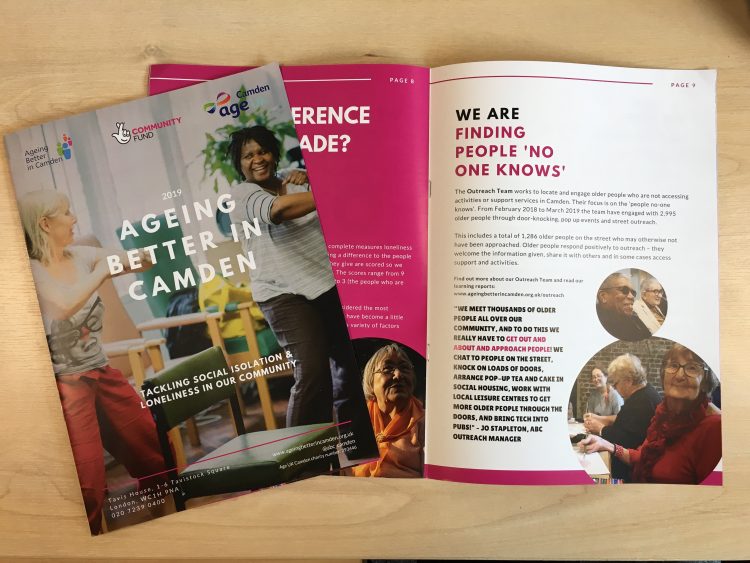Although coronavirus is currently dominating the headlines, the flu virus is currently a far bigger risk to the health of older people across London and the country as a whole. With spring on the horizon, it might seem odd that the team here at Age UK London are continuing to shout about the flu vaccine, but flu season can last as late as April, so it really is never too late to get your flu jab!
Tag: GP
Top Ten Facts About the Flu Jab!
“With many people travelling to visit family and friends over the Christmas period, doctors were keen to warn that grandparents planning to visit grandchildren were particularly at risk. This is because children are often referred to as “super-spreaders” of flu and the over-65s are one of the “at-risk” groups that can develop health complications, such as pneumonia, if they catch it.”
Unfortunately there are plenty of myths about the flu vaccine floating about which can put people off getting their flu jab. That’s why our very own Sharon Tynan has put together a list of the top ten facts about the flu jab to make sure you’re fully informed before you head to your GP or pharmacist.
Spread the word, not the flu!
“Even though the flu jab is free for those over the age of 65, Greater London holds eighteen of the twenty Clinical Commissioning Group (CCG) areas with the lowest flu vaccine uptake. In fact, the World Health Organisation’s target of vaccinating 75% of people aged 65 years and over continues to be woefully unmet by the majority of Clinical Commissioning Groups (CCGs), with only 15% (30 out of 195) of CCGs meeting that target in 2018-19. In addition, flu vaccine uptake amongst older Londoners was far lower than the national average of 72% in 2018/19.”
Our “It’s Never Too Late!” campaign, is a focused promotion of the flu vaccine across the capital. Find out all about the campaign here and get access to some free resources!
Adult Social Care in London: Achievements & Challenges
“London local government is proud of the role our adult social care services play in supporting Londoners. As London Councils’ recent report on the State of Adult Social Care in London makes clear, the sector has achieved significant successes in recent years – but there are also major concerns about future provision.”
Last week London Councils released the State of Adult Social Care in London report. Councillor Ray Puddifoot talks us through adult social care in London – both the achievements and the challenges…
Ageing Better in Camden
“One of the main reasons we have reached 7,000 older people and counting, is that we have had the opportunity to test and learn different approaches to our work and put the learning we have gathered into action.”
Ageing Better in Camden has come a long way in the last four years. Partnership Development Officer Corinna Gray tells us more.
Changing Care with the Older Persons Fellowship
“To help ensure that the voice of older people is heard and acted upon meaningfully, we need a long-term strategy that commits to the ongoing development, support, and appreciation of a workforce of nurses and allied health professionals who are working to lead, transform and sustain quality services for older people care.”
High quality care requires high quality professionals! Dr Joanne Fitzpatrick explains how the Older Persons Fellowship is helping to create a high quality workforce throughout the care sector.
Ageing Without Children in Hospital
“The stories of those without family in hospital are rarely heard, rarely actively sought out. In almost all cases complaints about treatment are raised by family members, if you don’t have a family, there is no one to raise complaints. An older person, ill, isolated and worried in hospital with little or no external visitors is not likely to “make a fuss”. As far as we know there has been no research targeted at finding out about the experiences of people ageing without children in hospital.”
We accept without question that if an older person requires treatment, it is undeniably better for them and for the hospital, that they have their family with them. But what about those who are ageing without children? Kirsty Woodard explains all:
London, how’s your Hearing?
“Informing yourself about hearing loss, and what help is out there, can be truly transformational. Unaddressed hearing loss can leave people feeling isolated, and affect their mental health. Speaking to people who understand what you’re going through, and can tell you what support is available makes all the difference. Many of those who have used our services have now gone on to take action and get the treatment they need.”
This week’s blog comes from Sinead Armitage, Regional Information Manager at Action on Hearing Loss, the largest charity for people with hearing loss in the UK. Sinead informs us about the UK Hear to Inform and Connect project, which has seen an increase in face-to-face information services across London.
An Introduction to Neurology
This week on the blog, our Administration Volunteer Daphne discusses her Master’s degree in Clinical Neurology and the ways in which volunteering has helped to shape her research. This is an introductory blog ahead of a series of posts on neurology from Daphne.
NHS 10 Year Plan – Some Progress but There’s Something Missing
“Prevention is key theme of the Plan, although it focuses specifically on 5 areas – smoking, obesity, alcohol, air pollution and anti-microbial resistance. But even this is a huge step forward in challenging the “treatment” model that the NHS is built on – dealing with what the patient presents as a problem. It also talks about individuals playing their part in achieving health outcomes, which is also welcome. The NHS needs to work “with” patients not “on” them.”
The NHS 10 Year Plan features some great leaps forward, but there’s something missing. Our CEO Paul Goulden explains why we should be pleased and what needs to change.










